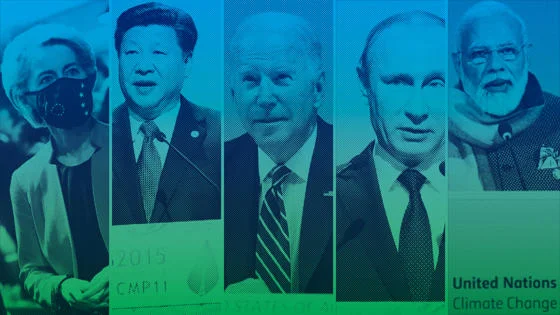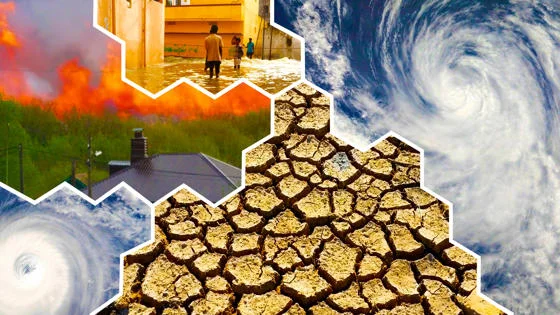Prioritising the climate: why international organisations are reinventing policy from the bottom-up

Contents
In 2001, a bureaucrat at the International Monetary Fund (IMF) was deployed for two years as a resident representative to a small island nation. While standing on a bridge a mere few feet above sea level, he was informed this was the highest point on the island. Shocked by this realisation, the official became one of the first staff members to discuss climate risks in an IMF report.
Years later, and now in a senior role at the IMF, he is still attentive to climate risks and is playing an active part in deliberations over the development of an IMF lending facility to help vulnerable countries bolster their climate resilience.
According to research by Dr Noah Zucker, an Assistant Professor in the Department of International Relations at LSE, and his co-author Dr Richard Clark from Cornell University, it is through bottom-up experiences like this that institutions like the IMF expand their policymaking to novel issue areas, such as climate.
The new paper, Climate Cascades: IOs and the Prioritization of Climate Action, finds that staff who are deployed to climate-vulnerable nations – like the Marshall Islands and Bangladesh – learn about the impact of climate change first-hand. They then take that knowledge forwards, sharing it more widely when they are later rotated to other countries and as they climb the career ladder.
We found bureaucrats were … able to learn from local experiences and take that with them as they moved to new postings, regardless of who was in charge at the time.
Bottom-up versus top-down
To undertake this research, Dr Zucker and his co-author used new data on the IMF's attention to climate change and IMF bureaucrats' career paths.
These data draw from Article IV reports published by the IMF, which summarise findings from the routine surveillance of member-state economies and identify risks to economic growth and stability. The researchers then coded which reports discussed climate change between 2000 and 2018 and identified the staff involved in the drafting of each report. This enabled them to document the IMF's increased focus on climate over time and the movement of climate-attuned staff through the institution's bureaucracy.
"Something that stands out in our findings is the magnitude of the effects we uncovered," explains Dr Zucker. "When the IMF sends a ‘climate-attuned bureaucrat’ to a country – that is, someone who has discussed climate on a prior assignment to another country – this nearly doubles the likelihood of the IMF then analysing climate in this new country."
Another notable finding was that these results occurred regardless of who the IMF Managing Director or Chief Executive was at the time. "Historically, in this area, the approach has always been to think about changes occurring from the top-down, driven by large member states such as the US or the UK. However, we found bureaucrats were still able to learn from local experiences and take that with them as they moved to new postings, regardless of who was in charge at the time. This really speaks to the importance of the bottom-up approach," Dr Zucker asserts.
Allowing on-the-ground bureaucrats some slack and ability to respond to these developments as they see them, leads to more adaptable and locally appropriate policymaking.
Enabling adaptable policymaking
Dr Zucker believes there are a lot of benefits to this bottom-up approach, especially in an area like climate change where there is a lot of uncertainty around how local communities will be affected. "For executives and managers, allowing on-the-ground bureaucrats some slack and ability to respond to these developments as they see them leads to more adaptable and locally appropriate policymaking."
Another benefit of this bottom-up approach is that it can provide a channel through which developing countries are able to have an indirect influence on global climate governance. Relatively poor countries and small island nations, which are typically thought of as less powerful and are often sidelined in international negotiations, can exert some influence through the socialisation of bureaucrats posted to their countries.
Whether there is active persuasion of bureaucrats by these countries is something Dr Zucker is keen to investigate further.
The Bridgetown initiative
With global conferences like COP28 taking place, Dr Zucker believes his findings are relevant to global climate governance. He points to the "Bridgetown initiative" as a pertinent example. Spearheaded by Barbados, the initiative looks at how legacy institutions like the IMF and World Bank, which have enormous financial resources and expertise, can be repurposed to help countries become more resilient to climate impacts. When a country like Barbados is hit by a hurricane, this damages their economy and their ability to invest in climate resilience, thus perpetuating a vicious cycle.
"I think our study is interesting in this context as it points to a means by which these institutions can possibly be repurposed," explains Dr Zucker. "Through a series of interviews with IMF staff we found some evidence that the bottom-up process contributed to the emergence of the Resilience and Sustainability Trust at the IMF, a new lending facility intended to give low-cost concessional loans to developing countries and help them build climate resilience. This Trust is a substantial break from what the IMF was doing previously.
"Someone we talked to at the IMF, who was involved in the creation of the Trust, told us he first started to think about climate change when he was a lower ranking official sent to a country severely affected by climate change. He said this really changed how he thought about countries and their economic wellbeing going forwards."
Going forwards, Dr Zucker and his research partner are planning to explore the quality of these climate reforms by international organisations and whether they are actually issuing high quality recommendations rather than simply paying lip service to the issue.
With climate change becoming an ever-pressing issue, any work and learnings that can help vulnerable countries to build resilience are key.
Dr Noah Zucker was speaking to Charlotte Kelloway, Media Relations Manager at LSE.
Download a PDF version of this article




